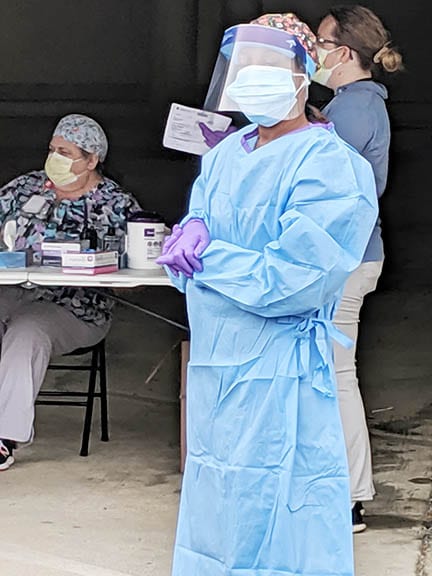By Vivian Shipe
KNOXVILLE, TN — It’s her district. She kept a watchful eye over the cars pulling in from all directions. It was 10 am and Commissioner Evelyn Gill was already in position. Gill, along with Cynthia Finch and other community leaders, had been working hard for the last few

weeks to bring testing into the African American community. She watched as the COVID-19 testing began. They had worked hard to find a central location to the inner city residents; the need for total access and the ability to test large numbers made the coliseum the best choice. “This pandemic knows no boundaries,” said Gill. “Today, we have an opportunity to provide free access to this test.”
Set up by the Knoxville Health Department in the parking lot of the Knoxville Civic Coliseum; the testing was administered as people answered questions and then received a nose swab. They were cautioned to self-isolate at home until they received a call with their results.
The testing was being done two ways: you could drive up or the front of the entrance was set up for walk-up testing. The youngest age that could be tested was 2 years old. Eight chairs set six feet apart. Each person nervously waited for their turn. One African American young man in his twenties groaned when he saw the test was to be administered nasally, but he didn’t leave. In another chair sat a young mother who could not hear. That barrier was broken down by a

volunteer who did sign language to explain the procedure to her. Safely across the way, her husband stood rocking their little baby awaiting his turn. Volunteers who spoke multiple languages were available in an effort that all who came, would be served. The people began to form a line even as the cars, many of which had been lined up long before the 10 am official start; began to snake down the three different road entrances. So many, they began to back up onto the main streets. There were so many cars, members of the 278 were directing the traffic along with the police department.
Finch, director of New Directions Health Care, who also oversees two of Knoxville’s Free Medical Clinics in the inner city, continued sounding the alarm in the community. She worked from her car; driving thru neighborhoods with flyers, encouraging the black community to come and be tested. She and other organizations had been distributing masks and gloves into the community for the last week. Finch, adamant that young people understand the disease can affect them too, has been training people on hand washing, social distancing, and the need for a face mask. She even has been making masks, fifty at at time, and freely giving them away.
The call to action was needed. African Americans are in far greater danger of dying from this illness due to pre-existing health conditions and limited access to health care.
In many areas across the nation, the majority of deaths have been people of color. Gill said “Testing remains critical. It is critical to help treat, isolate or hospitalize people who are infected. Testing is important in the bigger health picture regarding mitigation efforts, helping public health officials characterize the prevalence, and contagiousness of the disease. While we are facing an unprecedented health challenge, we also have the opportunity to do things differently than we have in the past. With that in mind, access to testing lessened disparities in our community.”



